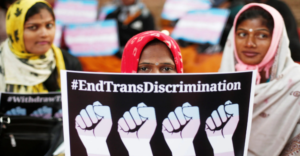DISCRIMINATION OF ELITE SPACES
Every student has dreams – dreams of being the best. And every student in India knows about the best of the best: IITs, IIMs, DU, AIMS etc. Every parent, sibling, relative and even neighbour pressurises you into having a dream about joining these institutions. But all that glitters is not gold and there is a lot that is happening in these ‘prestigious’ institutions.
In recent years, India has witnessed a disturbing trend of students of Dalit and other marginalised groups taking their own lives in prestigious universities. This trend highlights the deep-rooted caste and class discrimination that exists in Indian society and the failure of educational institutions to address these issues. There is a pattern of Dalit, Bahujan and Adivasi (DBA) and marginalised groups (religious and class) students taking their own lives in these top universities.
The most recent case of suicide is that of a Dalit student from the Indian Institute of Technology (IIT) Bombay, Darshan Solanki who took his own life after facing discrimination from his peers. One of his seniors said that Solanki faced isolation from his roommate and peers. The same happened at IIT Bombay where Fathima Latheef, took her life in November 2019. In her suicide note, she cited harassment by her professors and discrimination based on her religion and caste. This incident led to widespread protests and demands for justice.
However, Fathima Latheef’s case is not an isolated incident. In 2016, Rohith Vemula, a Dalit PhD scholar at the University of Hyderabad, committed suicide after facing discrimination and harassment from university officials. His death sparked nationwide outrage and protests. In 2018, Payal Tadvi, a postgraduate medical student from a tribal community, took her life in Mumbai’s BYL Nair Hospital. She was allegedly harassed and discriminated against by her seniors because of her caste.

Root Cause
These incidents reflect the systemic discrimination in India’s higher education system. Despite laws against caste-based discrimination, educational institutions have failed to address the issue. Students from marginalized communities often face discrimination, harassment, and isolation, which can take a toll on their mental health and well-being.
The issue is not limited to higher education institutions alone. Dalits and other marginalised groups face discrimination in all spheres of life, including employment, housing, and healthcare. Dalit students and students from other marginalized groups often experience discrimination in schools, which undermines their sense of safety and inclusivity. Furthermore, these students also face discrimination in government school meal plans, depriving them of equal access to nutrition and basic amenities. The suicide rate among Dalits is significantly higher than the national average.

This stems from the deep-rooted caste system in India. The upper castes have historically discriminated against the ‘low castes’ and abused them for their gain. Dalits were not allowed to live near upper-caste people, drink water from the same well, or receive an education. Although India has a very stringent rule in place that prohibits discrimination based on caste, the DBA community and other marginalised groups continue to face discrimination, harassment, abuse and microaggressions even today. There still exists a social consciousness that others them and sees them as the lesser.
‘True Merit’
The number one issue Dalits and other marginalised group students face on campus is discrimination due to the reservation that they received. Studies reveal a collective hate towards reservations in these prestigious universities and that they see students who have a seat through reservation as someone lesser to them.
News Reports show that because peers cannot outrightly ask other students about their caste or if they have reserved seats, they resort to asking them about their ranks in the competitive exams. This indirectly provides them with an idea about the caste of the students. This same tactic is applied by faculty as well.
People and especially Upper Caste people do not understand, or choose not to, that Reservation is affirmative action quotas. It is restorative justice for centuries of historical wrongs against the community. It makes up for their lack of privilege; the privilege that upper-caste students have – in terms of education, social capital, resources, connections etc.
To address this issue, educational institutions need to recognize and acknowledge the existence of caste-based discrimination and take proactive steps to prevent it rather than dismissing it as a rarity. This includes sensitisation programs for faculty and students, the strengthening of the grievance redressal mechanism, more strict punishments for abusers and the inclusion of Dalit and other marginalized perspectives in the curriculum and faculty.
In conclusion, the suicides of Dalits and other minority students in prestigious universities in India reflect the systemic discrimination in Indian society. Educational institutions, the government, and society at large need to recognise and address this issue to ensure that every student has access to a safe and inclusive learning environment. Education should not be monopolised by an elite few. It needs to be a space of empathy and compassion. Only then can India truly become a country where every citizen is treated with dignity and respect.
-LIYA ANN MARY
Must Read: CRIMINALIZATION OF MARITAL RAPE





